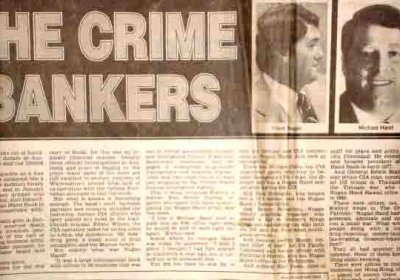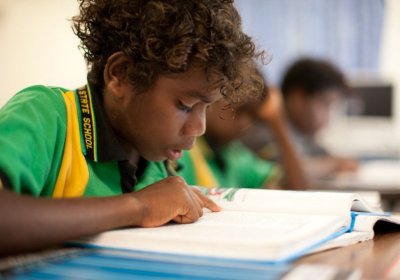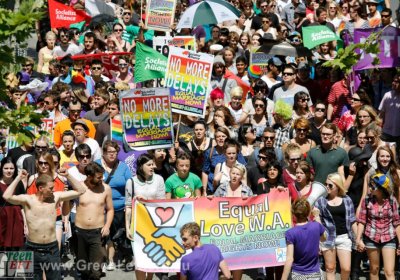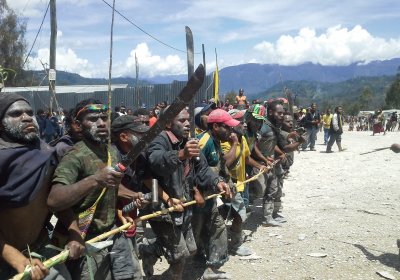More often than not I am not quick enough with a comeback and probably that is just as well. Just the other day, when I was out in the street distributing Green Left Weekly, a person roughly brushed past and muttered “traitor!”
She walked on and from about two metres away turned around, aimed her beady eyes at a poster I had put up advertising a Christmas visit to refugees in detention and shouted: “You are traitors, that’s what you are!”
“Give refugees some solidarity this Christmas,” was the headline on the poster.
992
Gelliondale Resources, a subsidiary of Melbourne company Ignite Energy Resources Limited, have applied for a “retention licence” for a project to mine brown coal at Gelliondale, in the South Gippsland region.
The application includes a work program of “field exploration activities such as drilling, sampling, excavation of costeans or pits and surveying,” according to the company website.
At the national refugee protest in Canberra on November 18, Greens Senator Sarah Hanson-Young concluded her speech by saying her first involvement in politics was through the refugee movement and that she used to come to rallies like this, until she realised that it was more important to change the minds of the people inside parliament, so she stood for parliament instead.
I’ve heard Hanson-Young and Greens candidates make similar statements previously.
I think such statements need to be challenged.
In early February 1978, on the strength of a claimed turnover of $1 billion, the Australian Financial Review reported that “at this sort of growth rate Nugan Hand will soon be bigger than BHP.”
Since launching in March 2011, the campaign to stop coal seam gas (CSG) mining has grown into one of the most powerful and broadly supported community campaigns ever seen in the Illawarra.
Involving unprecedented numbers of people, the immense pressure on the government has so far put a stop to the local CSG project, which threatens the drinking water for greater Sydney.
Ninety two percent of Indigenous languages are fading or extinct. Australia has suffered the largest and most rapid known loss of languages and past government policies have been largely to blame.
This is clearly outlined in the Our Land: Our Languages report which was released by the House of Representatives Standing Committee on Aboriginal and Torres Strait Islander Affairs late last year.
The unity discussions between the Socialist Alliance and Socialist Alternative have come to an end.
In a November 3 letter on behalf of the Socialist Alternative National Executive, Mick Armstrong wrote: “The overall political projects of both organisations are not sufficiently similar to carry through a sustained and productive unity that could advance the cause of the revolutionary left in Australia and the broader class struggle.”
The Socialist Alternative letter lists four major political differences:
After negotiating for 16 months, the Ambulance Employees Australia in Victoria say they are not much closer to securing a contract that gives them the pay levels they are seeking and protects the quality of their service to the public.
On December 4, the union rejected the latest offer from the state government for a 12% pay rise over the next three years.
"Qantas in crisis: 1000 jobs to go; Warning of $300 million loss; [federal transport minister Warren] Truss rules out aid," was the dramatic headline on the front page of the Sydney Morning Herald on December 5.
The deep problems ailing Australia's national airline pose a clear choice between two options: allow the airline to battle on in the chaos of the international airline wars, or re-nationalise Qantas as a key part of a socially progressive and environmentally sustainable public transport policy.
Under the guise of “law and order” — to protect the community from “criminal bikie gangs” and “pedophiles” — Queensland Premier Campbell Newman has rushed through several new laws. These are the Vicious Lawless Association Disestablishment Act, Tattoo Parlours Act, Criminal Law Amendment Act and Dangerous Sex Offenders Act.
Together with laws relating to the G20, and, amendments to industrial legislation, these laws have implications for the civil rights of the wider community.
Violent clashes have once again erupted between local people, police and company security guards at the giant Porgera gold and silver mine in Papua New Guinea's highlands, operated and largely owned by the Canadian corporation Barrick Gold – the world's biggest gold mining company.
A semblance of calm has returned to Bangkok as the royalist anti-democratic Yellow Shirt protesters were allowed to symbolically occupy Government House. They took pictures and left.
A temporary truce has occurred around the king’s birthday (December 5), since the royalists did not want to appear disrespectful to their “dear leader”.
- Previous page
- Page 5
- Next page










